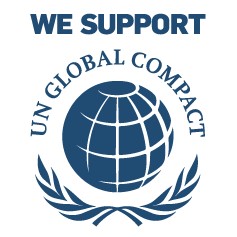Ensuring DIC Remains a Globally Trusted Corporate Citizen with a Proud Reputation
Leveraging Position as a Global Manufacturer of Fine Chemicals to Support the UNGC
Seeking to fulfill its responsibilities as a member of the international community in a more proactive manner, in December 2010 the DIC Group became a signatory to the United Nations Global Compact (UNGC). The Group simultaneously pledged its support for the Ten Principles of the UNGC.

Applying the Ten Principles of the UNGC
The DIC Group Code of Business Conduct conforms with the Ten Principles of the UNGC. The Group is capitalizing on its participation in this program to advance its operations around the world while at the same time giving ever-greater consideration to the environment and human rights, with the aim of ensuring sustainability for global society.
Ten Principles of the UNGC (Official Version)
| Human rights | Principle 1 | Businesses should support and respect the protection of internationally proclaimed human rights; and |
| Principle2 | make sure that they are not complicit in human rights abuses. | |
| Labour | Principle3 | Businesses should uphold the freedom of association and effective recognition of the right to collective bargaining; |
| Principle4 | the elimination of all forms of forced and compulsory labour; | |
| Principle5 | the effective abolition of child labour; and | |
| Principle6 | the elimination of discrimination in respect of employment and occupation. | |
| Environment | Principle7 | Businesses should support a precautionary approach to environmental challenges; |
| Principle8 | undertake initiatives to promote greater environmental responsibility; and | |
| Principle9 | encourage the development and diffusion of environmentally-friendly technologies. | |
| Anti-corruption | Principle10 | Businesses should work against corruption in all its forms, including extortion and bribery. |

